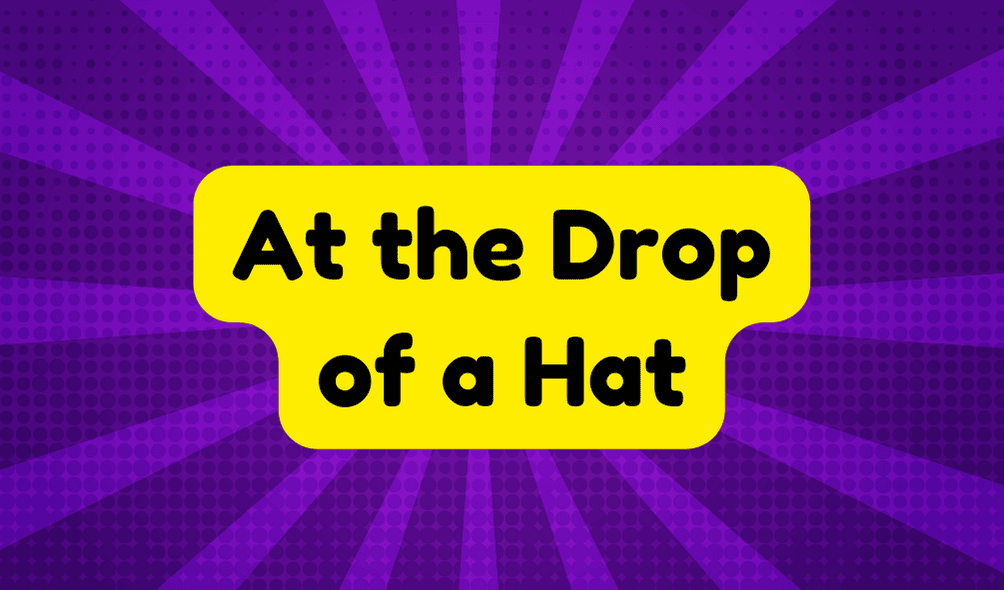The phrase "at the drop of a hat" refers to acting with immediacy and without much thought. It likely originates from the practice of signaling events, such as races, by dropping a hat. First recorded in 1837, it reflects a cultural inclination towards impulsive decisions. While spontaneity can be exciting, it may lead to negative consequences, as seen in situations like unplanned travel. Understanding its implications can offer insights into impulsive behavior and decision-making strategies.
Synonyms
When discussing synonyms for the phrase "at the drop of a hat," it is essential to contemplate terms that capture the same essence of immediacy and spontaneity. Although quick decisions may seem appealing, impulsive actions often lack the necessary foresight and consideration. Exploring alternatives invites deeper understanding:
- At the drop of a dime
- In a heartbeat
- Without a second thought
These expressions illustrate a similar urgency but may also evoke a critical perspective on decision-making. It's important to recognize that the excitement of spontaneity can lead to consequences, making it wise to balance action with reflection when necessary.
Example of Sentences
Examples of sentences that incorporate the phrase "at the drop of a hat" can illuminate its meaning and usage in everyday life. These situational examples highlight impulsive behavior, often without consideration of consequences.
- During a family emergency, Jason agreed to help at the drop of a hat.
- Sarah tends to make travel plans at the drop of a hat, which can lead to unexpected issues.
- School projects are often altered at the drop of a hat, causing stress for students.
Such idiomatic expressions reflect a cultural tendency towards spontaneity, emphasizing a lack of forethought that can sometimes prove problematic.
Origin
The origin of the phrase "at the drop of a hat" is somewhat intriguing, as it likely references the act of signaling the start of a contest or race by dropping a hat. Historical usage of this expression dates back to 1837, reflecting cultural impulsiveness in decision-making. It gained traction in the late 1800s, aligning with a spontaneous approach to life.
| Historical Reference | Meaning |
|---|---|
| 1837 Register of Debates | First recorded use |
| Contest/Race Context | Signals immediate action |
| Cultural Impulsiveness | Highlights lack of deliberation |
| Late 1800s Popularity | Spurred widespread use |
Collocations
Numerous collocations can be associated with the phrase "at the drop of a hat," revealing its versatility in everyday language. This idiomatic expression often accompanies discussions about spontaneous decisions, highlighting a cultural inclination towards quick actions.
- Act at the drop of a hat
- Decide at the drop of a hat
- Respond at the drop of a hat
While these expressions convey decisiveness, they also raise concerns about impulsivity. Rushing into actions without careful consideration can lead to unfavorable outcomes. Consequently, the use of such collocations invites careful reflection on the implications of spontaneous decision-making in various contexts.
How to Use in Everyday Language
Using the phrase "at the drop of a hat" can illuminate discussions about spontaneity in decision-making, but its application often requires a thoughtful approach. While spontaneous decisions might seem exciting, impulsive actions can lead to regret. For example, someone might quickly agree to a vacation idea without considering their finances or schedule. This phrase can serve as a reminder to balance enthusiasm with practicality. It encourages individuals to assess their impulses before diving in, ensuring that their choices come from a place of thoughtfulness rather than mere impulse. Hence, one should use this phrase wisely in everyday conversations.
Why Is It Still Relevant Today?
Spontaneity often brings excitement, and phrases like "at the drop of a hat" capture this essence perfectly. In a fast-paced world, the relevance of such expressions stems from the constant allure of impulsive decisions and spontaneous actions. People often find themselves drawn to immediate rewards, pushing them to act without careful consideration. This tendency may create exhilarating moments, but it also risks unwise outcomes. Understanding this phrase prompts reflection on the balance between seizing opportunities and making thoughtful choices. Consequently, "at the drop of a hat" remains pertinent, serving as both a call to action and a cautionary tale in modern life.






